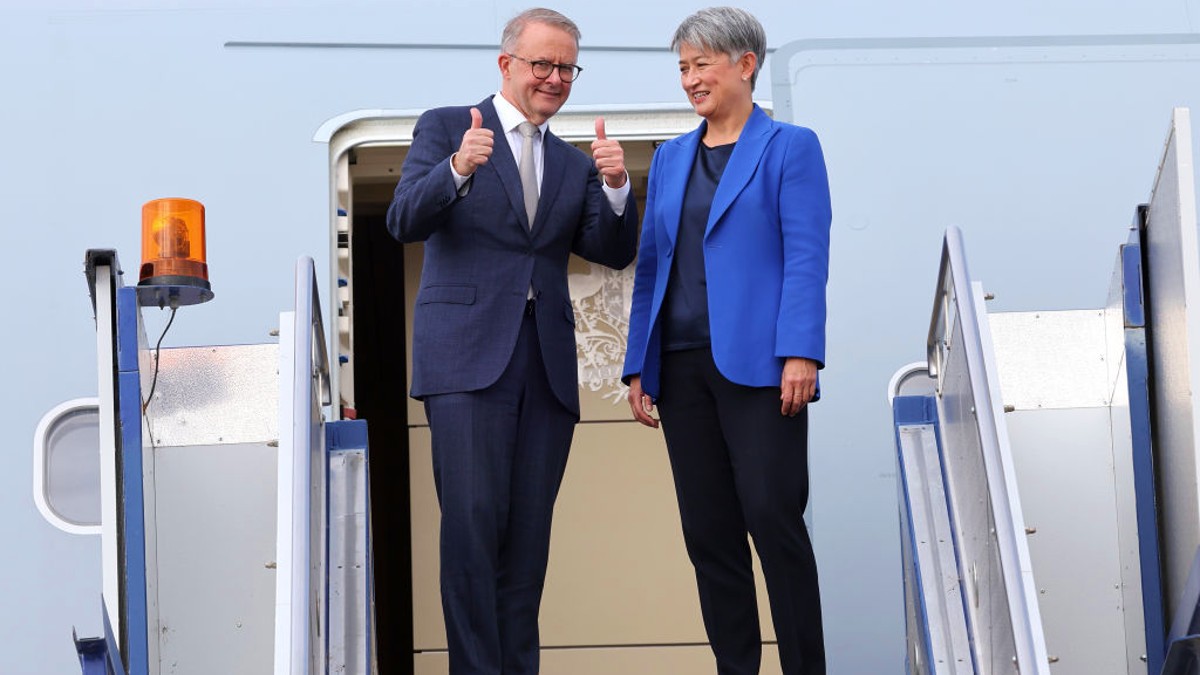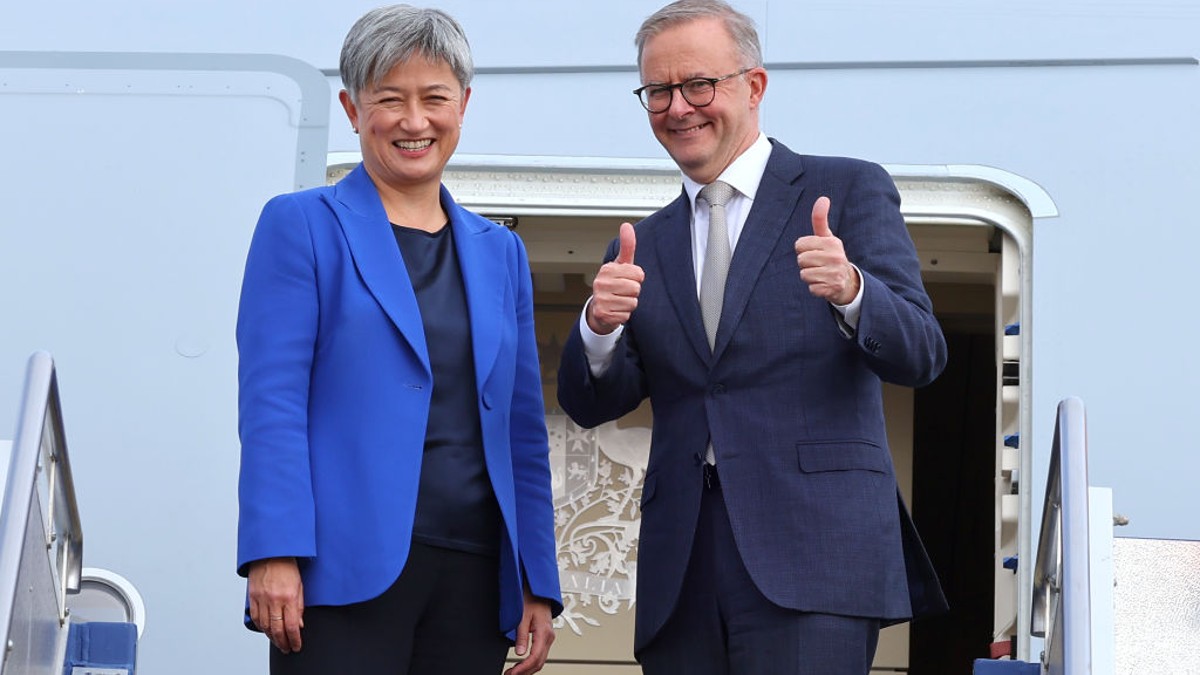Cheng Lei talks of China arrest: Will Albo handle Xi’s diplomacy of trade coercion and human leverage?

CANBERRA, AUSTRALIA - MAY 23: Prime Minister Anthony Albanese stands with newly appointed Foreign Minister Penny Wong, at the door of their plane on May 23, 2022 in Canberra, Australia. Albanese is travelling to Japan to attend the QUAD Leaders' meeting in Tokyo. Albanese was sworn in as Australia's 31st prime minister on Monday morning following his victory over Scott Morrison in the federal election. (Photo by David Gray/Getty Images)
The former Chinese state television news anchor Chéng Lěi 成蕾 is back in Australia, returning home to Melbourne last week after three pitiable years inside some of the murkiest detention in what’s been – even for China’s ludicrously murky judicial system – a dark period for foreigners on the wrong side, at the right time.
Last night Cheng spoke of her ordeal for the first time, telling Sky News how she was pinged for breaking an embargo and then became fodder for the state detention apparatus which ensures sleep deprivation remains one of China’s primary tools of control. That’s bright lights, total isolation, continual observation – and not knowing where or why or for how long you’ll be held – being just a few of the ingredients.
Cheng was a nationally recognised primetime anchor on China’s state-run English-language TV station CGTN when she was taken from her home on 13 August 2020.
While her return is wonderful news, the Chinese-born Aussie academic Yáng Héngjūn 杨恒均 remains in detention in the PRC and his health is all over the shop and while Cheng’s release – fab as it is – is clearly timed to help smooth the way for Prime Minister Albo’s visit later this year, any deterioration in Yang’s condition could and probably should derail all of that.
Albo goes to Beijing
Albanese’s visit, expected in November or December, will be the first by an Aussie prime minister to Beijing in seven years.
This has been on the cards for sometime now, but it was confirmed when Albo met with Chinese Premier Lǐ Qiáng 李强 at the East Asia Summit in Indonesia during a “frank and constructive discussion” Albo said he’d had with Li.
Albo would’ve met with Chinese President Xí Jìnpíng 习近平 on the sidelines of the recent G20 event in India, but in standing with Beijing’s mantra that access to the emporer is precious, Xi saw the value in snubbing Albo, the US, and especially host Indian Prime Minister Narendra Modi.
Albanese is seeking “productive and stable relations with China based on mutual benefit and respect.”
Xi, by incrementally taking things away from countries who do not agree with his intentions for China, is seeking concessions just to give them back.
Albo’s repeatedly promised to stand up for Aussie wine, lobster and agri exporters whacked hard by China’s punitive trade measures, first introduced when relations were so low, snatching TV anchors seemed like a reasonable idea.
But the mere fact Beijing’s decision to scrap some of the hefty tariffs – on Australian barley, for example – appear to be a massive diplomatic win, shows how difficult Albanese’s ability to press for other trade obstacles to be removed really is. And how discussions outside China’s interests simply won’t fall within Xi Jinping’s understanding of his carrot and stick diplomacy routine.
Albanese’s landmark visit to Beijing is great, but it’s also beset by the vested interests of our own powerful allies – China’s canny divide and conquer diplomatic two-step has experts from Washington to Jakarta extremely anxious at the outcome. The US is engaged in a tit-for-tat trade war with our largest trading partner, which has been happy to use economic coercion to achieve diplomatic goals.

Should Albo simply focus on the carrot of reinvigorating and resetting Australia’s once epic trade ties with China? Or should he actively lobby Xi to denounce his current hobbies – militarising the South China Sea, imprisoning minority groups, supporting Russia, siding with Arab states against Israel, continue to eye an invasion of Taiwan… or last on the list, release any Australian nationals in Chinese detention?
Beijing has a storied history of using bilateral meetings to drive wedges between its enemies allies. Separating Europe from America has proven as difficult at times as separating oil and water. Which by the way are immiscible liquids.
Homecoming
The Australian, last week, quoting a close source to Cheng said she was “in good health and good spirits”.
Canberra learned only in the past fortnight of a deal that would allow her release.
It involved her pleading guilty to the vague ‘state secrets’ charges that Beijing had made against her, which officials and experts here have always considered trumped up and politically motivated.
Her time in custody in her Beijing cell covered the nearly three-year sentence.
Last night, Cheng told Sky that when she was arrested, the newsroom called her to come to the office for a “very important meeting”.
When she arrived, ‘there were 20 people’ waiting for her.
“One of them stood up, presented his badge and took me back to my apartment,” where Cheng says they looked for evidence all day.
As they were leaving she was told to turn off the power and water before asking her ‘Are you sure you don’t want something to eat?’
“So I made myself a homemade bread, toasted sandwich, with cheese and avocado,” she said. “And those three things I ended up not having for over three years.”
Cheng found herself inside a system every Chinese knows well and not at all.
The 48-year-old disappeared into “residential surveillance at a designated location,” oblique coded language for an equally oblique government run network of isolated and secret prisons for reserved for individual security threats.
Once inside the system, access is almost impossible. And prisoners are habitually subjected to interrogations and sleep deprivation.
“It’s to make you feel isolated, and bored and pained and desperate,” Cheng said.
In the final period of isolation the pressure was ramped up; Cheng was not allowed to read or write, so spent every day sitting in her small dark room.
“They said that they gave me 15 minutes of fresh air, but all they meant was, there’s a window up the top that a guard would open for 15 minutes… But the curtains are still drawn while the windows are open. You never saw anything except the blue curtains, the … carpet and the beige padded walls. It was just silence.”
Destroying bridges
China’s human rights image climbed out of these shadows during the ‘period of reform and opening up under the previous regime of president Hu Jintao. But that image first tottered when encumbent President Xi first took control in 2012 and immediately began his forever-purge of internal enemies – like Bó Xīlái 薄熙来 – and things just went downhill from there.
Bo was a huge name in China from back in my day – a new maverick style of Chinese former politician whose grandiose ambitions placed him directly on a collision course with the current leader.
Bo was a reformer as the Mayor of Dalian when I lived there in 2002 and his brash style and big spending saw him climb first to the governorship of Liaoning and then – from 2004 to November 2007 – as Minister of Commerce.
Bo was no saint. He made his way to the city of Chongqing – rich with Communist history – and began a bizzare and extravagant performance as a Mao-evanagelist.
That was short-lived. The princeling’s wife Gu Kailai 谷开来 was convicted in 2012 of murdering British businessman Neil Heywood and was given a suspended death sentence, later commuted to life imprisonment in December 2015.
Convicted on bribery and embezzlement charges in 2013, Bo himself was found guilty of corruption, stripped of all his assets and sentenced to life imprisonment. He remains incarcerated at Qincheng Prison.
That was thought to be the apex of Xi’s internal purge of state-enemies. But the ‘corruption crusade’ continues.
Foreign currency exchange
However, for any rules-based democracy with a semi-transparent judicial system, what amplifies Western outrage is what Xi’s been doing to Australians and other foreigners like Lei and Cheng.
The snatching and imprisonment of foreign citizens on vague, spurious, mysterious and ridiculous charges is both a blunt and ultimately self-harming diplomatic tool, unworthy even of the Chinese Communist Party.
China – like any rising nation – faces resistance to the challenge it provokes from the perceived natural global order. In this case one which has been maintained largely unchanged from the end of the Second World War.
China’s industrial-scale repression of Uyghurs in Xinjiang, its militarisation of the South China Sea, or even (this one might sound familiar) the use of trade or economic coercion or punish partners which offend Beijing, could be understood if not forgiven as the product of a nation with 5,000 unbroken years of despotism, struggling to find a path to free market modernity.
But what does the most harm to Beijing’s reputation – especially amongst the foreigners who know China best, such as the business people, officials, scholars, and journalists like me who know the people, speak the language and were previously highly sympathetic and full of hope – is the seemingly arbitrary hits that happen to people like Cheng.
Xi’s thinking is as manifold as it is misguided.
All high profile detainees are manifestly to provide an example to the captured audience of state media. Both domestic and foreign – in this the method pays for itself – ensuring any bubbling dissent gets an eyeful of what awaits.
Then the diplomatic messaging is parsed out. Anything you do contrary to Chinese interests comes with a very human price, one that democratic governments are particularly sensitive to.
Consider the two other prominent recent examples of this.
When the the Huawei CFO Mèng Wǎnzhōu 孟晚舟 was arrested in December 2018 by Canadian authorities acting on the behest of the US, days later two Canadians, Michael Kovrig and Michael Spavor, were snatched and disappeared for nearly three years. During which time Chinese officials didn’t even try to pretend it was for any other reason than retaliation and leverage against the arrest of Meng.
Ultimately the ploy worked – charges against Meng were dropped and she was allowed to return to China after spending three years in luxurious house arrest in her mansion in Vancouver. Kovrig and Spavor were released on September 24 from the same by-the-book torture that Cheng Lei experienced.
‘Fully safeguarding all the rights Cheng Lei is entitled to under the law’
The two other prominent foreign citizens were nabbed in China for reasons that appear closer to ex-PM Scott Morrison being rude, then the ridiculously vague espionage charges they were supposed to have been arrested for include both Cheng and the writer/activist/academic Yáng Héngjūn 杨恒均.
Last week, with Albanese’s impending visit to Beijing getting closer, Cheng was released.
But Yang is a different matter. He remains in a terrible situation, and the damage China has done to itself with the arbitrary detentions of the last few years will not be easy for analysts – both China hawks and doves – to forget.
Upon Cheng’s release, China’s foreign ministry spokesperson Wang Wenbin told journalists that the Chinese judiciary ‘made judgments lawfully, and fully guaranteed the rights of the parties concerned in accordance with the law, respecting and implementing the consular rights of the Australian side, including consular visits and notifications.’
She was ‘lured by a member from an overseas organisation,’ and in ‘violation of the confidentiality agreement signed with her employer, she illegally provided the foreign organisation the state secrets that she grasped during her work using her mobile phone,’ the official said.
“In August 2020, Beijing State Security Bureau took criminal measures against Cheng after an investigation.
“Cheng confessed the facts of the crime, and voluntarily pleaded guilty. The No.2 Intermediate People’s Court of Beijing, through trial, sentenced Cheng to an imprisonment of two years and 11 months, plus deportation,” Wang said last week.
Cheng did not appeal, according to the authorities:
澳大利亚籍人员成蕾被国家安全机关依法执行驱逐出境_一号专案_澎湃新闻 – The Paper
MSS statement on the release of Cheng Lei:
On October 11, Cheng Lei, an Australian national, was deported by the Beijing Municipal Bureau of National Security after completing her prison sentence.
10月11日,澳大利亚籍人员成蕾在服刑期满后,被北京市国家安全局依法执行驱逐出境。
Cheng Lei, female, born in June 1975, of Australian nationality, was formerly employed by a media outlet within the country. In May 2020, Cheng Lei was approached by a person from a foreign institution and violated the confidentiality agreement signed with her employer by illegally providing content classified as national secrets, which she had access to through her work, to this foreign institution via her mobile phone. The Beijing Municipal Bureau of National Security opened an investigation and took criminal coercive measures against Cheng Lei in August 2020 in accordance with the law. After her case was filed, Cheng Lei truthfully confessed her criminal acts and voluntarily accepted her guilt and punishment. The Beijing No. 2 Intermediate People’s Court, after an open trial, sentenced Cheng Lei to two years and eleven months in prison for illegally providing state secrets to foreign entities, with additional deportation. Cheng Lei did not appeal. The Chinese judicial authorities strictly handled the case in accordance with the law, fully safeguarding all the rights Cheng Lei is entitled to under the law.
Overnight Cheng told Sky News that while she was not allowed to divulge details, she described her crime as having shared a government briefing before she went on air, breaking an embargo by a few minutes.
“In China, that is a big sin,” Cheng said. “You have hurt the motherland. And the state authority has been eroded because of you.”
Beijing is hoping to capitalise on the October 7 Hamas attacks on Israel – as Israel’s ferocious reaction widens a political, ideological, and in many cases economic distance between the West and the Rest.
The 3rd Belt and Road Forum for International Cooperation begins in Beijing this week.
The glittering gust list includes Russian despot Vladmir Putin, a senior Taliban dignitary, several leaders of major nations like Indonesia, Chile, and Kazakhstan, and representatives from 140 countries in total. (There are 193 member states of the United Nations.)
Xi is forging his new world order, and global leaders are eager to be dealt in.
Last week, Albo said Cheng’s release wasn’t part of any deal with Beijing and merely followed the completion of China’s judicial process.
Yang Hengjun has been detained since January 2019 and continues to await a verdict in his case with his judgment deferred.
The 59-year-old writer Yang – who was jumped at the airport in Guangzhou during a crazy-brave visit to family in 2019 – remains in the deepest, murkiest kind of Chinese legal limbo one could hope to never ever be in.
The federal government says it continues to advocate for the release of the pro-democracy activist who warned in August of his ailing health, after doctors discovered a kidney cyst.
Yang’s supporters say he hasn’t received information about his condition or treatment.
Yang’s position is precarious. He’s been vocal against the One Party system and was sentenced for espionage in May 2021 but the verdict has been delayed and delayed again and again. It speaks to his defiance, but also to his danger that any show trial currently put down for January next year won’t go ahead until the defendant is at their most compliant.
With his own Treasurer Jim Chalmers repeatedly warning that Australia’s economic outlook was contingent on China’s economy and its ongoing strength, Albanese – with very few pieces available to move on the board – heads to Beijing with a weak hand and only hard choices.
Related Topics
UNLOCK INSIGHTS
Discover the untold stories of emerging ASX stocks.
Daily news and expert analysis, it's free to subscribe.
By proceeding, you confirm you understand that we handle personal information in accordance with our Privacy Policy.








